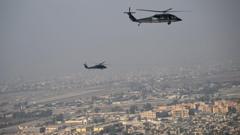In an environment of escalating security risks in Iraq, the United States government has begun evacuating non-essential staff and their families from its embassy in Baghdad. This move comes amid stalled negotiations regarding Iran's controversial nuclear activities.
US Embassy in Iraq Begins Partial Evacuation Amid Rising Security Concerns

US Embassy in Iraq Begins Partial Evacuation Amid Rising Security Concerns
Heightened tensions over Iran's nuclear program prompts US to evacuate non-essential personnel from Baghdad embassy.
The US State Department acknowledged the dynamic nature of security assessments related to embassy personnel. A spokesperson stated, "Based on our latest analysis, we decided to reduce the footprint of our mission in Iraq," although specific threats leading to this decision were not disclosed. President Trump expressed declining optimism over reaching a resolution concerning Iran's uranium enrichment practices, which are critical to discussions around nuclear armament and sanctions.
Iranian officials, including Defence Minister Aziz Nasirzadeh, have indicated potential retaliation against US interests in the region should discussions fail or military actions ensue. Furthermore, Defense Secretary Pete Hegseth approved voluntary departures for families of military personnel stationed across the Middle East amidst growing concerns over Iran's offensive capabilities.
As tensions mount, the UK’s Maritime Trade Operations has warned that military disputes in the region could disrupt maritime shipping. Concurrently, the price of oil has surged over 4%, reflecting fears of potential supply disturbances due to the unfolding geopolitical situation. With approximately 2,500 American troops stationed in Iraq, the overall security landscape remains precarious.
With diplomatic ties strained and uncertainty looming, this escalating situation bears watching, as both nations navigate a complex interplay of diplomacy, security, and regional stability.
What ramifications might arise from these developments, and how might they influence the broader Middle Eastern geopolitical landscape?
Iranian officials, including Defence Minister Aziz Nasirzadeh, have indicated potential retaliation against US interests in the region should discussions fail or military actions ensue. Furthermore, Defense Secretary Pete Hegseth approved voluntary departures for families of military personnel stationed across the Middle East amidst growing concerns over Iran's offensive capabilities.
As tensions mount, the UK’s Maritime Trade Operations has warned that military disputes in the region could disrupt maritime shipping. Concurrently, the price of oil has surged over 4%, reflecting fears of potential supply disturbances due to the unfolding geopolitical situation. With approximately 2,500 American troops stationed in Iraq, the overall security landscape remains precarious.
With diplomatic ties strained and uncertainty looming, this escalating situation bears watching, as both nations navigate a complex interplay of diplomacy, security, and regional stability.
What ramifications might arise from these developments, and how might they influence the broader Middle Eastern geopolitical landscape?





















